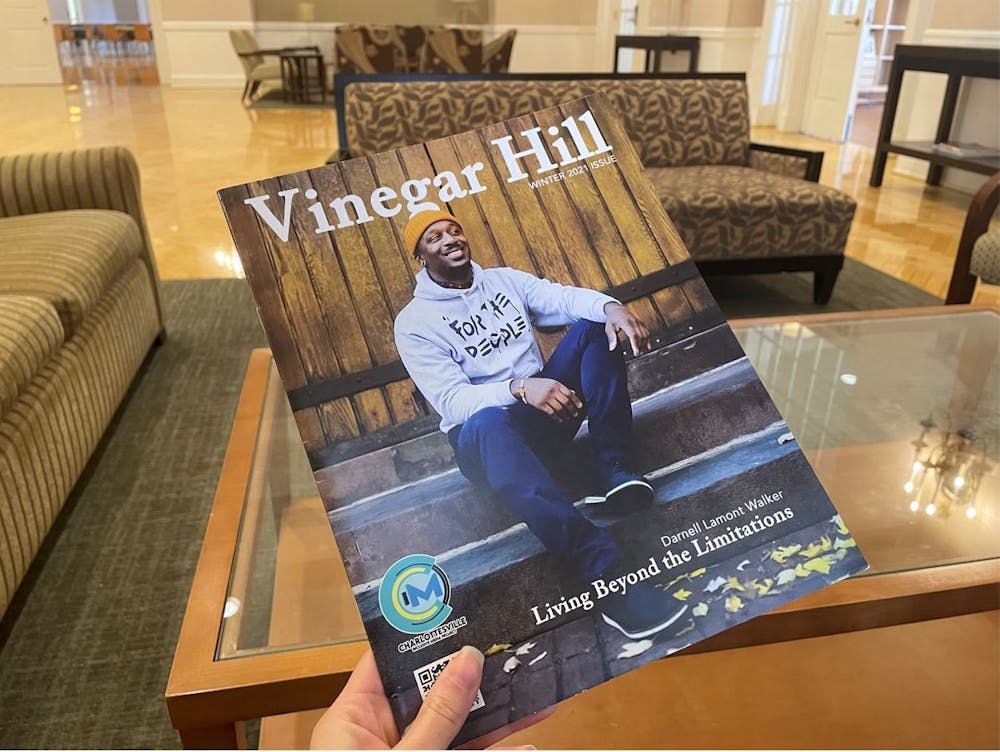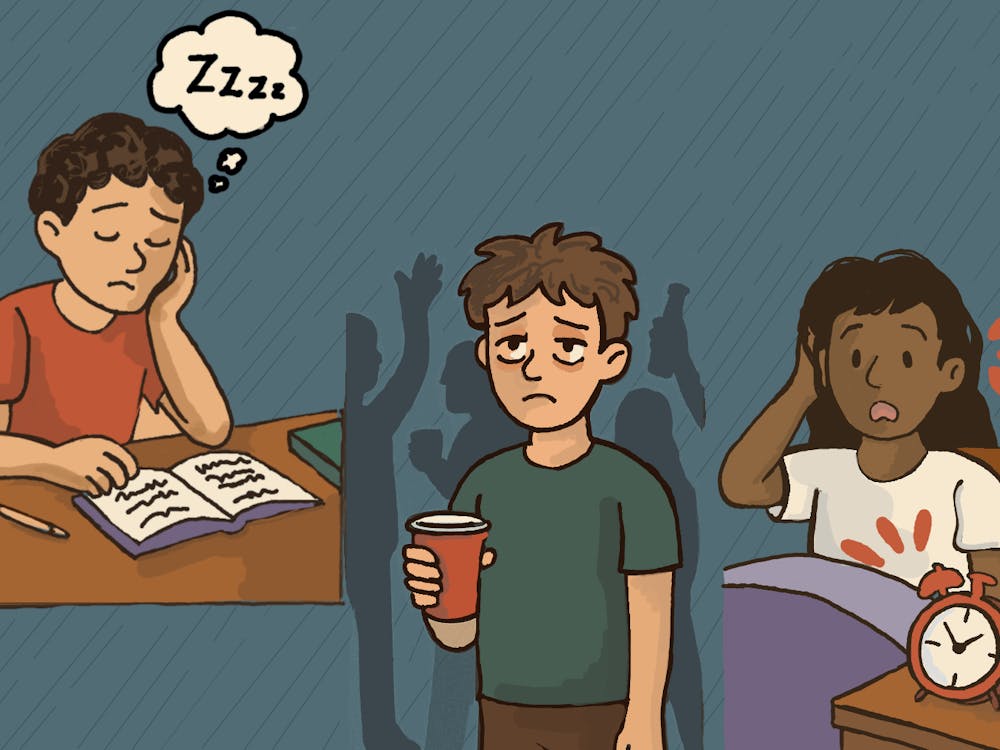We’ve all heard the phrase “hidden gem” before, and now the University has its own between the shelves of the Ivy Stacks — Vinegar Hill Magazine. Founded in 2011, the publication is dedicated to amplifying Black stories in Charlottesville, featuring the voices of community members and promoting local small businesses. The publication can also be found online as of 2018 and will soon be made available at Clemons Library.
The Special Collections Library currently holds two issues of this publication from the summer and fall of 2017 — the result of a prior motion to bring the magazine to Grounds by Research Librarian of Architecture Rebecca Coleman. Moving ahead, the University will now hold an indefinite subscription to the publication and is seeking to collect all previous issues as well. It wasn't until this semester that Katrina Spencer, librarian for African American and African Studies, first heard about the publication and began the process of bringing this regular influx of copies to libraries on Grounds.
According to Spencer, the University Library Collections Team has regularly-scheduled diversity, equity and inclusion meetings in order to talk about possible gaps in the diverse range of the collections held by the University. The team had been talking specifically about local publications that could be brought to Grounds when Spencer proposed Vinegar Hill Magazine as a potential collection.
“We had a session about different local groups within the Charlottesville community whose works we might be able to acquire and collect,” Spencer said. “We wanted to know if there were any underrepresented groups whose works we could be collecting, and at that point … I was aware of Vinegar Hill Magazine … so I suggested that we collect it.”
After learning about the publication itself, Spencer got in touch with Sarad Davenport, content manager and digital strategist for Vinegar Hill Magazine, to yield a better understanding of its history and operations. Davenport has been heavily involved with the publication since he first joined in 2012, and said the publication was a community response to a clear lack of representation in the media for people of color.
“I personally wasn't part of it when it started,” Davenport said. “The publisher — his name is Eddie Harris — and a group of people, grassroots folks from the African American community who were displeased with the local coverage around issues of people of color, and particularly these issues that portrayed… people of color as criminals [started it]. Early on … it was attractive to folks because it was a response to exclusive media and it took a more inclusive approach.”
As explained by Davenport, the title of the magazine itself holds a story behind it. Vinegar Hill was once a flourishing Black community between what we now know as the Downtown Mall and the Corner. In the 1960s, a series of harmful redevelopments promoted by the City of Charlottesville displaced families and Black-owned businesses in this area, leading to housing displacement and gentrification that still affects Black communities in Charlottesville to this day.
Despite having its story pushed to the side for decades, Vinegar Hill still holds value for the Charlottesville area’s Black community. Davenport mentions how he hopes to refind this flourishing community within the pages of the publication.
“What we've done with the Vinegar Hill story is to attempt to reconstruct it,” Davenport said. “Maybe not in its original sense, but [to] reconstruct it from a cultural perspective and entrepreneurial perspective — [it’s] a decentralized version of its own self where we can inspire people to remember a time where people were very much so invested in community.”
The latest edition of Vinegar Hill Magazine featured a discussion with Jocelyn Nicole Johnson, author of “My Monticello,” a conversation with Darnell Lamont Walker, a writer for Netflix’s new animated show “Karma’s World” and a celebrative story about the first year in business for Me2U — a brick and mortar clothing store. In between these accounts, the publication promoted small, local businesses — many of them Black-owned.
According to Davenport, the magazine recently fostered a partnership with In My Humble Opinion on the James Radio station and Charlottesville Tomorrow as a part of the Charlottesville Inclusive Media Project. As the publication continues to work on its commissioning budget, Davenport hopes to have more writers and creators on board soon, noting that there aren’t restrictions on who can submit their work.
“Part of our partnership with Charlottesville Tomorrow is [that] we're really thinking about how we can support journalism and the profession and make sure that journalists and the profession [are] respected,” Davenport said. “We're continuing to work on doing better at commissioning … anybody can write for us, as long as it kind of fits our archetype.”
Vinegar Hill has so much more to do to help reach other audiences in the Charlottesville community. Davenport wants to be able to provide resources to allow other local creators to be a part of this magazine. There are aspirations of hopefully reaching national audiences. Vinegar Hill aspires to continue to change the social narrative surrounding Black communities.
“I want the publication and I want us to be able to support content creators, artists [and] photographers in a way that allows them to live, work and play in Charlottesville,” Davenport said. “I also don't see Vinegar Hill as something that's going to be just local and regional… I think that it can be bigger if we continue to refine … who the audience is.”
The University Library System is currently working on adding more of this publication and other publications like Vinegar Hill to its shelves. University Video Collection Librarian Leigh Rockey explains the importance of including a wide range of representation in the University’s many libraries.
“One of the library’s biggest goals is to continuously review the strengths and weaknesses of the collections in terms of diversity, equity and inclusion,” Rockey said. “We're focusing not simply on adding diversity as a project, but on equity of representation [in our] collections as lasting systemic change. We want to bring students, faculty researchers — a wide representation of voices and communities — and we will be committed to that for the foreseeable future, probably forever”.
Rockey said that although students will have to request the publication on the University’s Virgo website for now since it is held in the Ivy Stacks, the next released publication and the proceeding newest publications should be made available on Clemons’ current periodical shelves soon.
Spencer agreed with Rockey’s emphasis on the need for greater representation and equity in the Charlottesville and University community, adding that it should be one of the University’s missions to document a diverse range of local stories, including those found among the pages of Vinegar Hill Magazine.
“The University of Virginia is considered the flagship university of the state,” Spencer said. “One of the missions of a university such as this is to document local and regional life — to document the history and also the present and the future of the life of Virginia. Charlottesville specifically … would not be the Charlottesville that we know today without Black people. It's part of the fabric of this region [so] documenting Black life is necessary to really get the full picture.”
Vinegar Hill is hoping to become a historical document for individuals in the Charlottesville area — a historical document that records Black lives in the city. This publication is a reminder that only we can tell our own stories in order to reclaim voices that were lost. This publication may be small, but it certainly has a lot to say.







